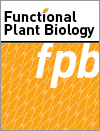A series of experiments were conducted to compare ancient emmer and spelt wheats to modern durum and bread wheats. Emmer wheats lost less K+ and photosynthetic pigments in response to salinity, and demonstrated greater proline accumulation and more antioxidant enzyme activity, compared to modern wheats. Our novel results indicated that an enhanced salt tolerance stems from the enhanced expression of SOS1 and NHX1 transporter genes by the emmer wheat. This study showed that emmer wheat tolerates 150 mM water salinity.

Functional Plant Biology
Volume 52 Number 8 2025
DELLA proteins can participate in the biosynthesis pathway of flavonoids. Trypsin can upregulate the expression of HuGAI1. And HuGAI1, by participating in the phenylpropanoid biosynthesis pathway, regulates the biosynthesis of flavonoids and flavonols, leading to an increase in antioxidant flavonoid content and, consequently, enhancing fruit resistance. This research provides a reference for trypsin’s ability to enhance the preservation of H. undatus by influencing GRAS family genes.
FP23242 Abstract | FP23242 Full Text | FP23242PDF (2 MB) | FP23242Supplementary Material (1.9 MB) Open Access Article
Industrial hemp (Cannabis sativa) growth habits vary from tall and thin to short and bushy. We compared the growth patterns and water deficit responses in genotypes with different growth habits using state-of-the-art automated imaging and watering platforms. Water deficit responses were consistent, but short, bushy genotypes show potential for the greatest water use efficiency, providing valuable insight to inform field-based agronomic decisions.
FP24266 Abstract | FP24266 Full Text | FP24266PDF (3.1 MB) | FP24266Supplementary Material (638 KB) Open Access Article
We assessed the effect of arbuscular mycorrhizal fungi (AMF) on growth, nutrient uptake, and productivity of chickpea (Cicer arietinum), and AMF diversity in two soils in Pakistan. Soil from Bhakkar had higher nitrogen content than Khushab. Root colonisation was greater in Khushab than Bhakkar, with colonisation influencing phosphorus uptake in both regions. Glomus and Acaulospora were the most dominant genera. Chickpeas from Bhakkar had higher protein content and nutrient concentrations than Khushab. AMF colonisation increased plant moisture, fats, and carbohydrates.
This article belongs to the collection: Soil Microbiome and Abiotic Stress Tolerance in Plants.
FP24326 Abstract | FP24326 Full Text | FP24326PDF (4.4 MB) Open Access Article
Zanthoxylum armatum (pepper) has important edible and medicinal value, but the existence of prickles of Z. armatum makes the harvesting work complicated. One hundred and ninety-five ZabHLHs were identified in the genome of Z. armatum. We predict that ZabHLH110, ZabHLH161, and ZabHLH194 are most likely related to prickle development in Z. armatum. This study is helpful to further explore the potential role and mechanism of ZabHLHs in the formation of Z. armatum prickles.





